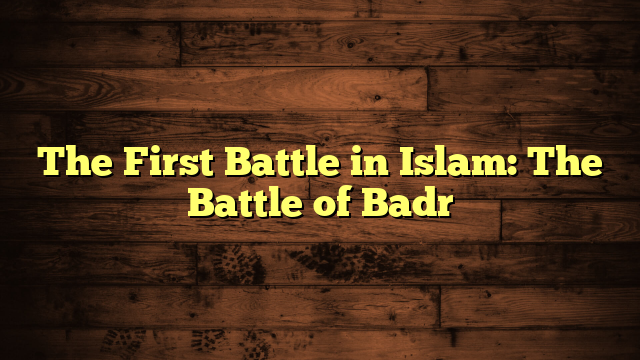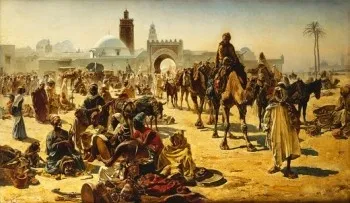The First Battle in Islam: The Battle of Badr

1. Historical Background
The Battle of Badr took place on the 17th of Ramadan in the second year after Hijrah (corresponding to March 13, 624 CE). It was the first decisive military confrontation between the Muslims, led by the Prophet Muhammad ﷺ, and the Quraysh tribe, led by Abu Jahl. It marked a turning point in the history of Islam.
2. Causes of the Battle of Badr
a. Persecution of Muslims in Mecca
For 13 years, Muslims endured severe oppression in Mecca: torture, killings, confiscation of property, and forced displacement. This made them rightful in seeking justice and reclaiming their stolen rights.
b. Seizure of the Emigrants’ Wealth
When Muslims emigrated to Medina, Quraysh usurped their homes and wealth. The Muslim attempt to intercept Quraysh’s trade caravan was a legitimate means to retrieve their confiscated property.
c. Quraysh’s Ongoing Threat
Quraysh continued to plot against the Muslims even after their migration to Medina. The Prophet ﷺ recognized the inevitability of confrontation, given Quraysh’s belligerence.
d. Ensuring Security for the New Muslim State
The Prophet ﷺ needed to secure Medina and safeguard the peaceful spread of Islam. The battle was not for aggression, but for defense and deterrence.
3. The Immediate Circumstances
a. Interception of Quraysh’s Caravan
The Prophet ﷺ led about 313 companions to intercept a large caravan returning from Syria under Abu Sufyan, carrying goods owned by Quraysh’s elite.
b. Quraysh Mobilizes for War
Abu Sufyan, sensing danger, rerouted the caravan and sent an urgent message to Mecca. Quraysh mobilized a large army of over 1000 men, heavily armed, led by Abu Jahl. Even though the caravan escaped, Quraysh insisted on continuing to Badr to display their power and intimidate the Muslims.
c. Location and Strategic Position
The battle occurred at Badr, a site with wells and access to water, strategically advantageous for whoever controlled them.
d. The Night Before Battle
The Prophet ﷺ spent the night praying and calling upon Allah for victory. He supplicated: “O Allah, if this small band of Muslims is destroyed, You will not be worshipped on earth.”
4. Outcome of the Battle
a. A Miraculous Victory
Despite being outnumbered, the Muslims defeated the Quraysh. About 70 Quraysh men were killed, including prominent leaders such as Abu Jahl, Utbah ibn Rabi’ah, and Umayyah ibn Khalaf. Another 70 were taken as prisoners. On the Muslim side, 14 were martyred.
b. Severe Blow to Quraysh
The loss of key leaders and warriors shocked Quraysh and weakened their standing among Arab tribes.
c. Rising Status of Prophet Muhammad ﷺ
The victory solidified the Prophet’s political and religious authority in Medina and elevated his leadership in the Arabian Peninsula.
d. A Moral Lesson
The battle proved that victory is not determined solely by numbers or weapons, but by faith, strategy, and moral integrity.
e. Islamic Principles for Dealing with Prisoners
After the battle, the Prophet ﷺ initiated humane policies for war captives. Some were freed in exchange for ransom or education, highlighting Islam’s ethics in warfare.
f. Escalation of Conflict
Badr marked the beginning of open warfare between Islam and Quraysh, leading to future battles such as Uhud and the Trench.
5. Lessons and Values from the Battle of Badr
-
Leadership and Consultation: The Prophet ﷺ engaged his companions in decision-making, emphasizing the value of shura (consultation).
-
Faith and Trust in God: The Muslims’ unwavering belief in Allah was a key factor in their resilience and success.
-
Compassion in Warfare: Even with enemies, the Prophet ﷺ upheld mercy and justice, prohibiting the killing of non-combatants and the mistreatment of prisoners.
-
Avoidance of Arrogance in Victory: The Prophet ﷺ remained humble and attributed success to Allah alone.
6. Conclusion
The Battle of Badr was not just a military confrontation; it was a moral and spiritual landmark. It illustrated the Islamic vision of warfare based on justice, restraint, and ethics, far from revenge or greed. It was a day that transformed the fate of a persecuted minority into a rising civilization.
If you’d like, I can format this into a ready-to-publish article or provide scholarly sources to support its content.


